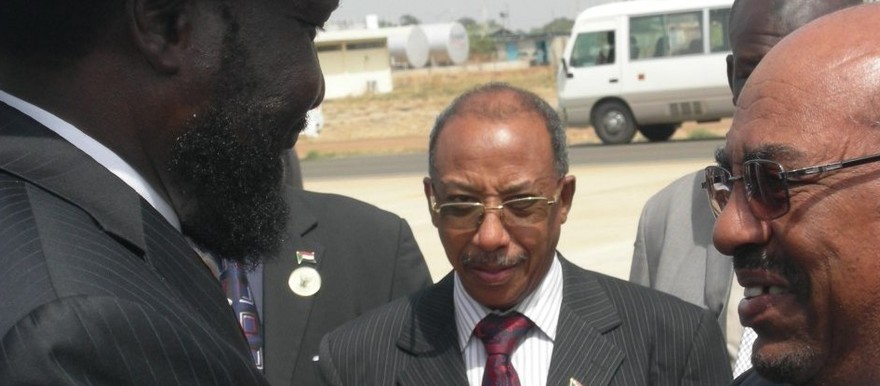The leaders of the two Sudans today lauded each other for economic progress made between the two countries recently and resolved on new measures for cooperation in the areas of banking, trade and immigration.
Most of the decisions reached at the summit related to provisions of the Addis Ababa Agreement of 2012. Unlike earlier summits, where discussion of security issues dominated the agenda, today’s meeting instead highlighted primarily economic issues.
“We are delighted to be with you,” said President Salva Kiir in remarks to his guests from Khartoum. “It will go down in the history that now things are changing for the better.”
Kiir pointed to the rain showers in Juba today as a sign of blessing, saying that it indicated that the visitors from Sudan had not come in bad faith. He also thanked Bashir for making donations to flood victims in South Sudan calling it “the work of an elder brother.”
The President of Sudan was likewise generous in his public remarks, stressing the benefits of the ongoing cooperation and reaffirming unequivocally his support for the Addis agreement.
“Our last meeting and the follow-up on-the-ground led to positive effects for the two peoples in the two countries. We have all learned the happiness which overwhelmed the peoples of Sudan and South Sudan by the positive visit made by Brother Salva Kiir to Khartoum, which was actually the beginning of the new chapter of these relations,” said Bashir.
Cross-border trade
Besides the direct meeting between Kiir and Bashir, the two sides also held “high-level ministerial and technical meetings to enhance cooperation in the areas of trade and investment, private sector and civil society organizations,” according to a joint communiqué issued after the meetings.
The meetings resulted in a decision to expedite procedures for opening border crossings between the two countries, a step that has been delayed by failure to agree on the ‘zero line’ between the two sides. A deadline has been set for mid-November for identification of the zero line for purposes of establishing the Demilitarized Border Zone as well as the crossing points.
Both sides appear keen to re-establish cross-border trade, with explicit mention of “the principle of soft borders” as well as a decision to establish a new joint management mechanism to “facilitate movement of people and goods and regulate other shared benefits.”
The presidential summit expands on recent technical agreements between the two countries, including a decision by Sudan to grant South Sudan special privileges at ports on the Nile and at the Red Sea. Officials today also discussed the role of the Central Banks, the work of a joint committee on oil monitoring and export, and the requirement of visas for travel between the two countries.
Abyei and Kordofan downplayed
Whereas earlier North-South diplomacy has foundered over Juba’s alleged support for the Sudan Revolutionary Front, today’s summit outcome appears to point to the continuation of oil flows and progress toward resumption of cross-border trade.
There was little emphasis today on the Kordofan war, with the outcome communiqué making only passing mention of “ceasing of support and harbouring of rebel movements.”
Likewise, the dispute over the Abyei referendum was addressed only tangentially through allocation of oil revenues for the local government of the territory.
South Sudan’s foreign minister in remarks to Bakhita Radio yesterday downplayed the legitimacy of the planned community referendum to be held by the Ngok Dinka.
His remarks suggest that Juba and Khartoum are unlikely to be headed toward another bitter row even if the unilateral referendum goes ahead as planned. Tribal leaders in the region, however, have warned of potential violence in connection with the poll.
See also: Presidents dodge mention of Abyei referendum (22 October)




